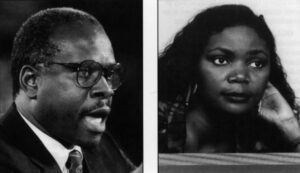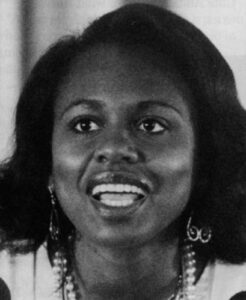Like the Kennedy assassination, Watergate and the Vietnam war, the Clarence Thomas-Anita Hill hearings have become a defining event in history that promises to be be reexamined, replayed and reevaluated for decades to come.
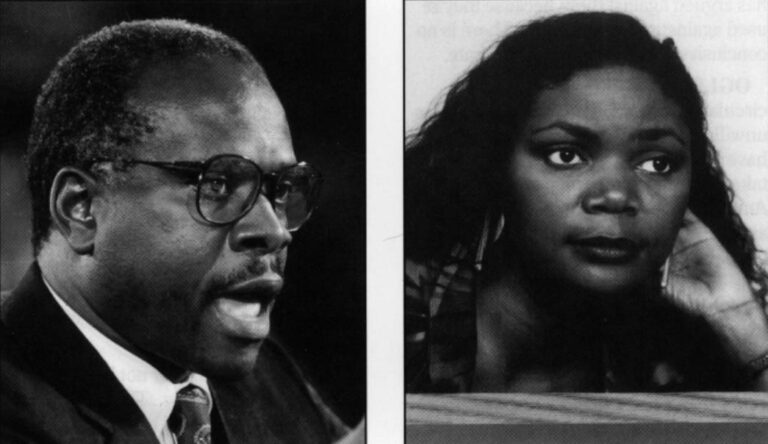
Photo courtesy of AP Wide World Photos
Part of the reason is that even though millions of people witnessed the hearings, the public still doesn’t believe it has gotten the full story.
Why wasn’t Angela Wright, the “other woman” subpoenaed by the committee and standing by in Washington, ever called to testify about inappropriate sexual remarks she said Thomas made to her? What’s the real reason Anita Hill didn’t testify a second time? Why didn’t Senate Judiciary Committee chairman Joe Biden defend Anita Hill more aggressively?
The hearings so inflamed the country that most of the principals, including Hill and Thomas, have refused to give interviews. Now two key players, Sen. Biden and one of Anita Hill’s lawyers, Harvard law professor Charles Ogletree, respond in taped interviews to some of the most controversial aspects of the hearings.
They clash on many of the hearings’ key issues. Biden passionately argues that Anita Hill’s positive lie detector test and Thomas’ reported pornographic movie-viewing habits were not relevant; Ogletree is adamant that they were. The men are in surprising agreement on other aspects: that Angela Wright’s testimony could have changed the course of history and the only reason Clarence Thomas is on the Supreme Court is because he is black.
Biden was interviewed a few months before the first anniversary of the October 1991 hearings. Ogletree was interviewed a few months before the second anniversary and was asked to respond to some of Biden’s comments, contentions and observations.
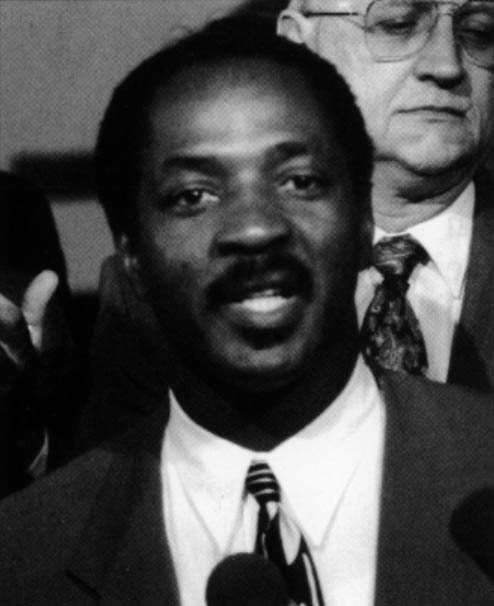
Charles Ogletree
Photo courtesy of AP Wide World Photos
WAS ANITA HILL’S LIE DETECTOR TEST RELEVANT?
BIDEN: Even though the rules of evidence do not pertain (in congressional hearings), they do give us great insight into the best way to shed light on the truth….Case in point: Lie detector tests. I fought for over 20 years (against) their admission (in court) because every civil libertarian, including every women’s group, has argued against them because they’re used against people wrongly. There is no conclusive evidence they are accurate.
OGLETREE: Rumors had been circulating rampantly that Anita Hill was unwilling to take one. And that would have been the story –unwillingness to take one….I think the point is that if Anita Hill had failed the lie detector test, I assure you those would have been the first words out of Sen. (Orrin) Hatch’s or Sen. (Alan) Simpson’s mouths. The reason it was so important is that they were calling her a liar. Now these things aren’t used in court very widely, but they are important investigative tools. In fact, every major federal and law enforcement agency uses lie detector tests.
When we made the decision to take the lie detector test, we realized there was no fair process. That they were not going to ask Anita Hill probing questions about what happened. They were going to ask her whether she had had a traffic ticket, maybe who she slept with, who her roommates were. And on the other hand, Judge Thomas said, `I’m not going to talk about my private life at all’….
The real problem is that the rules of evidence were totally irrelevant. I mean you had Alan Simpson and others reading from newspaper clippings or letters from people who weren’t under oath. Sen. Hatch apparently enjoyed reading from The Exorcist. Talk about rules of evidence. What is the relevance of that?
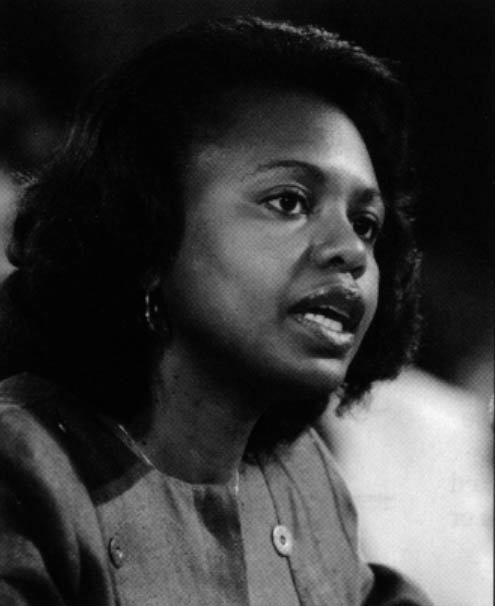
Anita Hill
Photo courtesy of AP Wide World Photos
WAS CLARENCE THOMAS’ ALLEGED PORNOGRAPHIC MOVIE-VIEWING HABIT RELEVANT?
BIDEN: Women will come in and say, `Why didn’t you let in (evidence of Thomas’ alleged pornographic movie viewing habits)?’ How about if there was evidence that SHE liked pornography? Would it have shed any light on whether or not she was telling the truth? (Such information about Thomas) would have been independent verification that Thomas watched pornography, not that he talked to her about it, any more than if he had said, `This woman is promiscuous,’ and then I established that this woman had slept with four different men in one week. Would that have proven whether she was telling the truth or not? Just because she slept with four men, does that mean she can’t be harassed? It would have been prejudicial if it were in a court room, and it would never have been allowed.
OGLETREE: Thomas’ (alleged pornographic movie viewing habit) was certainly relevant because it ties directly into the allegations and his denials. He denies pretty emphatically ever having made the comments that Professor Hill says he made. And part of the proof of her allegations are some of the movies. Like the movie “Big Bad Mamma Jamma” that reportedly was on one of his lists and that described the woman with large breasts.
And it’s not whether or not he has an interest in pornography. That’s not the question. The question is whether or not he made these particular comments and what would be the corroborating circumstances to show that he made them….I don’t think that is disqualifying in terms of his serving on the Supreme Court, but I think it is a question of whether he was honest about a whole host of questions.
WOULD ANGELA WRIGHT’S TESTIMONY HAVE CHANGED THE COURSE OF HISTORY?
Angela Wright is another woman who had worked for Thomas at the EEOC who had been subpoenaed by the Senate Judiciary Committee. She told committee staff who interviewed her that Thomas had pressured for her dates and made inappropriate comments about her appearance, once asking at an EEOC seminar, “What size are your breasts?” Although she was standing by in Washington, she was never called to testify at the hearings.
While Biden says he “insisted” that she testify, Wright and her attorney say that was never communicated to them. Instead, they recall that Biden’s counsel Cynthia Hogan suggested that Wright ask the committee to withdraw her subpoena. She refused, saying if the committee wanted to withdraw it, that was their perogative, but she was willing to testify if the committee called her.
In a last-minute, late-night maneuver, Wright and her attorney say Biden offered the concept of a letter releasing her from the subpoena but putting her testimony and that of a corroborator in the official record. Wright acceded to the offer, explaining that her consistent position had been that she was not asking to testify, but she was willing to testify if the senators called her.
BIDEN: “I believe (her testimony) could have (changed the course of history). Now others believed that she would hurt Anita Hill.
OGLETREE: We were concerned about anything that would hurt Anita Hill. But Anita Hill was not going to be hurt by Angela Wright. Congress’ job would have been more complicated –they would have to beat up on a second black woman in the course of 48 hours, and that is something they had to weigh…..
I thought her willingness to come forward was commendable, but their treatment of her was despicable and unforgivable. And I think that literally she would have changed the course of history….
BIDEN: I was told (Angela Wright) wanted the subpoena lifted and that people who were strong Anita Hill people wanted the subpoena lifted. They believed that Anita Hill’s testimony was so strong standing on its own that no matter how good anyone else was, it would be diluted. It would take away from it.
OGLETREE: If Biden in implying that Hill’s team opposed Angela Wright’s testimony, that is absolutely, unequivocally, categorically, and positively false. And that is the greatest creative use of fact and fiction that I have heard from these hearings. There is no one associated with the Anita Hill team who will tell you or can tell you that we opposed Angela Wright’s testimony….We desperately wanted Angela Wright to testify because she was the one additional witness who was both willing and able to come forward and state that on another occasion Justice Thomas had engaged in conduct that was tantamount to sexual harassment….
And we think that would have taken this thing over the top. It is absolutely absurd for Sen. Biden or anyone else to suggest that anyone associated with Anita Hill prevented Angela Wright from testifying. We wanted her to testify, and we wish she had testified. And we thought the whole deal that both sides of the Congress made to allow her testimony to be submitted in the middle of the night without examination is shameful and reflected poorly on the entire process.
(Her information) was not extraneous. This was solid, concrete testimony, corroborated by another person, that was highly relevant. It’s hard for anyone to have suggested that it wasn’t relevant.
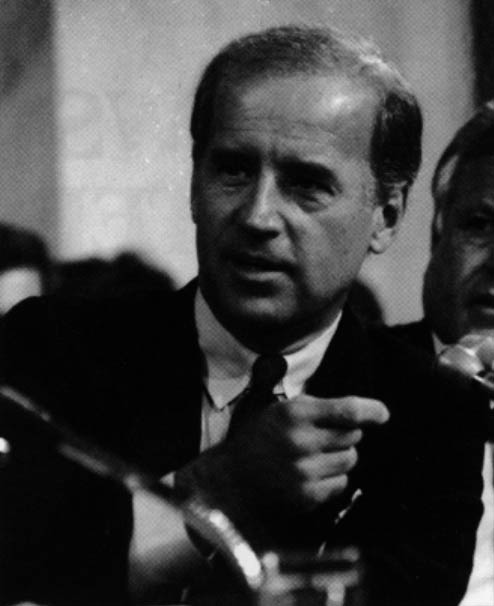
Sen. Joe Biden (D-Del.)
Photo courtesy of AP Wide World Photos
WHY WASN’T A PANEL OF SEXUAL HARASSMENT EXPERTS CALLED?
BIDEN: I wanted a panel on sexual harassment to come and testify, so we could put in context what we were talking about. And it was decided by the Hill people that they didn’t want that panel to come on. Again, there was a feeling –communicated to me secondhand — that Anita Hill had won this thing. She had made her case. And I kept saying, `wrong, this ain’t over.’ I was very disappointed ….Whether or not it would have helped Anita Hill, it would have enlightened; it would have shed more light on the veracity of the comments that had been made by all parties in my view.
OGLETREE: “It’s absurd to say that he supported that. He has just recreated history….Not only did we suggest (such expert testimony), but we had Louise Fitzgerald (University of Illinois professor and expert on sexual harassment) physically in Washington…prepared to testify. We told not just Sen. Biden’s staff, but several staff members that weekend, that she was not only anxious and willing, but very capable of discussing these issues.
Expert testimony can only help explain why a woman would come forward a decade later to bring in allegations of sexual harassment. So with all due respect, Sen. Biden completely has it wrong. And I think this is as self-serving as the earlier representations about why they didn’t take Professor Hill’s early allegations very seriously and treat them in a more public manner than they did when they were first aware of her concerns….
Whether Biden made the decision in a vacuum or after consulting with the members of both parties or just the Democrats, there was a determination made that no expert would be called, and we were sorely disappointed.
WHY DIDN’T SEN. BIDEN DEFEND ANITA HILL MORE AGGRESSIVELY?
BIDEN: Do I have any regrets (about the hearings)? That I didn’t attack the attackers more. Some of the articles that have been written say, `Why didn’t I do what the Republicans did?’ If I had done what the Republicans did, I would have made a lie of everything I think I stand for. I ran for the United States Senate in part because I truly believed the one hallmark of my 20-year career is that civil liberties mean a great deal to me.
Mark me down as not joining the school that the end justifies the means. What’s wrong with America is that we have gotten to the point where our perception of what is right and wrong is judged on the result. I am not going to join the parade that violates the most fundamental sacred principle that I think should judge and govern those who govern.
OGLETREE: (Senator Biden) doesn’t understand that by sitting back and taking no position that he has encouraged the victimization of Anita Hill. She has civil rights and civil liberties, too. She wasn’t applying for a lifetime appointment on the Supreme Court. She was not coming forward with an agenda to change the landscape of America.
And so for him to say that he didn’t help her because he didn’t want to be like the other side, to me, is to acknowledge that he has neglected to do his duties. He was the chairman. He was supposed to ask tough questions. He was supposed to get to the bottom of issues….And the bottom line is that Anita Hill was pilloried from beginning to end without any protection from anybody in that process….
What the senator did regrettably was to bend over in the wrong direction, and I think he did a great disservice in the sense of civil rights by being so tolerant of the lack of responsiveness on the part of one party and being so intolerant of efforts on the other side to bring out issues that may have shed light on (Thomas’ character).
WHY DIDN’T ANITA HILL TESTIFY A SECOND TIME?
BIDEN: I also wanted Anita Hill to come back and gave (her) that opportunity. But again, I’m not criticizing. I could just as well have been wrong.
OGLETREE: In fact, Anita Hill was not only prepared but willing and interested in testifying a second time and had a wonderful rebuttal statement — just brilliant rebuttal statement that I hope she, at some point, will share with the public. But given the Alan Simpson claim that what he intended to do was start talking about pubic hairs or whether she had roommates with men or women and whether she was liberal or conservative or whether she had traffic tickets or was a good or bad teacher….These were things we felt went far beyond the pale and went not to character assessment but character assassination.
And it was my judgment, over the objection of some of the other lawyers, that Anita Hill was not going to be subjected to more abuse. She was not going to go through it unless we had the power to object to lines of questioning. And that was not the power given to us.
WHAT WAS THE SIGNIFICANCE OF THOMAS PLAYING THE “RACE CARD”?
BIDEN: Thomas was the one in my view engaging in racism, and I not only mean racism in terms of playing the race card, but racism in trying to reinforce the stereotypical notion about black women. That was the sin I don’t forgive the guy for and those who were making his case.
OGLETREE: I think Judge Thomas’ use of the term `high tech lynching of an uppity black’ was brilliant and decisive. It was very effective rhetoric, and it allowed him to, in a sense, distance himself from his handlers in the White House and to give his own personal sense, as a black man, that he felt abused. He also turned the race card in a way that completely emasculated people like Sen. (Ted) Kennedy and Sen. (Patrick) Leahy and others who felt very uncomfortable challenging a black man on questions of sexuality….
And in a sense, the fact that this group was all white and all male made it a very easy attack and made their defense impossible. But Biden shouldn’t blame Thomas. He should blame himself for not having the courage to look beyond that attack and going forward and probing in these very relevant issues to find a resolution to one of the most perplexing issues to confront our country in the last century.
IS THOMAS ON THE COURT ONLY BECAUSE HE IS BLACK?
BIDEN: “I think that the only reason Clarence Thomas is on the Court is because he is black. I don’t believe he could have won had he been white. And the reason is, I think it was a cynical ploy by President Bush.”
OGLETREE: Biden’s partly right. It was not a cynical ploy by Bush. It was a brilliant ploy by Bush, and I give him credit for it. It was perhaps the single most important decision that George Bush made as president. What he was able to do by nominating Clarence Thomas was to drive a wedge in the civil rights community that separated brother and sister, mother and father in ways that have never happened before.
Because what he said was, `Here is a black man. Now let me see you criticize him. Are you criticizing him because he is black? Are you criticizing him because he is conservative? Are you criticizing him because you don’t think he is competent? Whatever reason you’re criticizing him, it’s no loss for the president, because I will have ample reason to say, `I’ll never nominate (a black) again. I will never put anyone through what he went through.’
So it was a brilliant move on the part of the president. And what he did was show the very soft underbelly in the liberal community that could not tolerate a challenge that really tested the essence of racial politics….
I think that what Bush did was not cynical, but it was from my point of view, and other agree with this, a confirmation that Republicans strongly believe in affirmative action. Justice Thomas was the affirmative action candidate. He was not the best person for the job. He was not the best African American for the job. He was not a brilliant judge…
So I think that the real significance of all this is that the president was able to get what he wanted. He was able to drive a wedge in the civil rights community, and now those, particularly civil rights leaders who were reluctant to oppose Thomas, regret that they didn’t because he’s turned out to be far more conservative than they ever imagined.
@1994 Florence Graves.
Florence Graves, the founding editor of Common Cause Magazine, is a research fellow at Harvard University’s Institute of Politics and one of the reporters who broke the Sen. Bob Packwood sexual misconduct story in The Washington Post.

